(完整)初中语法介词讲解
初中英语介词用法总结
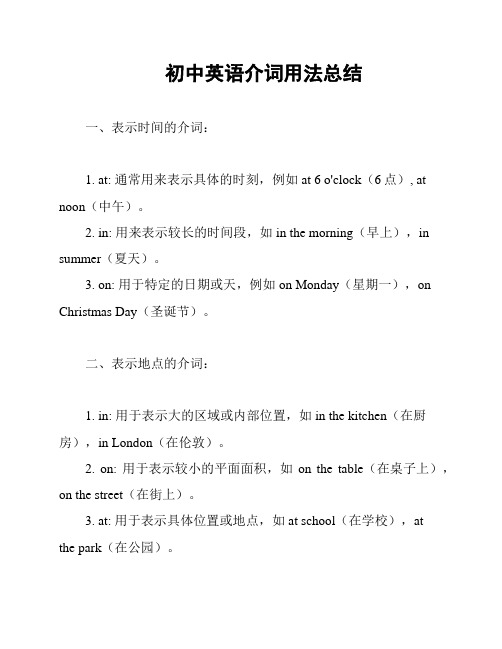
初中英语介词用法总结一、表示时间的介词:1. at: 通常用来表示具体的时刻,例如 at 6 o'clock(6点), at noon(中午)。
2. in: 用来表示较长的时间段,如 in the morning(早上),in summer(夏天)。
3. on: 用于特定的日期或天,例如 on Monday(星期一),on Christmas Day(圣诞节)。
二、表示地点的介词:1. in: 用于表示大的区域或内部位置,如 in the kitchen(在厨房),in London(在伦敦)。
2. on: 用于表示较小的平面面积,如on the table(在桌子上),on the street(在街上)。
3. at: 用于表示具体位置或地点,如 at school(在学校),atthe park(在公园)。
三、表示方式、方式、原因的介词:1. by: 表示通过某种方式或手段,如 by bus(乘公交车),by email(通过电子邮件)。
2. with: 表示伴随或使用某物,如with friends(和朋友一起),with a pen(用一支笔)。
3. for: 表示目的或原因,如 for fun(为了好玩),for the reason (因为...)。
四、表示动作方向的介词:1. to: 表示运动或行动的方向,如 go to school(去学校),send a letter to(寄一封信给)。
2. into: 表示进入某个内部空间,如 jump into the pool(跳进游泳池)。
五、表示关系和连接的介词:1. of: 表示所有关系,如 a photo of my family(我家的照片)。
2. with: 表示随同或具有某种关系,如 a girl with long hair(一位长发的女孩)。
3. to: 表示某种连接或关联,如 the key to the door(开门的钥匙)。
初中语法大全讲解--介词
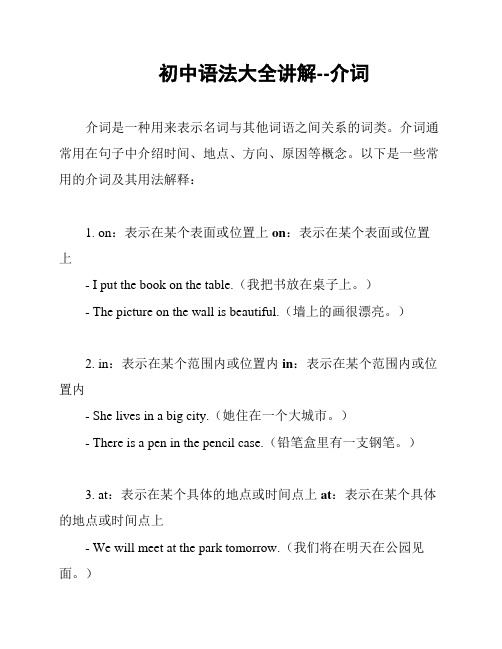
初中语法大全讲解--介词介词是一种用来表示名词与其他词语之间关系的词类。
介词通常用在句子中介绍时间、地点、方向、原因等概念。
以下是一些常用的介词及其用法解释:1. on:表示在某个表面或位置上on:表示在某个表面或位置上- I put the book on the table.(我把书放在桌子上。
)- The picture on the wall is beautiful.(墙上的画很漂亮。
)2. in:表示在某个范围内或位置内in:表示在某个范围内或位置内- She lives in a big city.(她住在一个大城市。
)- There is a pen in the pencil case.(铅笔盒里有一支钢笔。
)3. at:表示在某个具体的地点或时间点上at:表示在某个具体的地点或时间点上- We will meet at the park tomorrow.(我们将在明天在公园见面。
)- He is waiting for you at the front door.(他在门口等你。
)4. to:表示朝向某个目标或对象to:表示朝向某个目标或对象- She walked to school.(她走向学校。
)- Can you pass the book to me?(你能把书递给我吗?)5. with:表示伴随或使用某个工具或对象with:表示伴随或使用某个工具或对象- I went to the park with my friends.(我和我的朋友一起去了公园。
)- He wrote the letter with a pen.(他用钢笔写了这封信。
)6. by:表示通过某种方式或交通工具by:表示通过某种方式或交通工具- We usually go to school by bus.(我们通常坐公交车去学校。
)- She sent the gift by mail.(她通过邮寄发送了礼物。
初中英语中考语法知识介词分类讲解(共18类)

中考英语介词分类讲解一、表示方位in:在某块更大地域的内部on:两块地接壤, 挨着to:两块地不接壤, 中间隔着【例】上海位于中国的东部.Shanghai is in the east of China.(上海是中国境内的一座城市, 处于中国内部)广东在广西的东南边.Guangdong is on the southeast of Guangxi.(广东与广西挨着, 两块地域相邻)台湾在福建省的东南面.Taiwan is to the southeast of Fujian.(台湾与福建隔海相望, 中间并不接壤, 隔得较远)east东south南west西north北①以上4个方位词既是名词(n.),又是副词(adv.)②两两组合, 就可以组成:东南southeast、东北northeast、西南southwest、西北southnorth另4个方向.【例】向西走用名词:go to the west(west属于特指, 前面必须加定冠词the)所有特指的名词前面都要加the, 比如太阳☀️只有一个, 使用时-the Sun, 同理月亮 -theMoongo是不及物动词(vi),后面跟名词必须要加介词to(不清楚及物动词/不及物动词的小伙伴, 请跳转 :【笔记】英语语法入门到精通(17)| 动词之:及物动词&不及物动词)用副词:go west(这里副词west修饰动词go)【例】向西走10米.go west/ go to the west ___ 10 meters.根据之前的结构判断原则, 10米属于名词, 前面的结构是完整的, 只不过省略了主语.go west是谓语+adv.,这里可以看成是主谓+adv., 结构完整.go to the west中, go是谓语, 介词to和名词the west共同构成介词短语, 整体也可看成主谓+介词短语, 结构完整.剩下的10meters是名词, 而完整的句子结构后面只能是adv./介词短语, 因此空行里一定是介词.答案:go west/ go to the west for 10 meters.二、表示上下↑在....上:over、above、on↓在....下:beneath、under、below①正上-正下:over-underover还有覆盖在某物体上面的意思, 也属于接触面, 但注意和on的区别, on只表示在物体表面, 没有覆盖的意思.②非正上-非正下:above-below不强调正上方/正下方时, 只要是上/下方都可以用.③表面上-表面下:on-beneath【例】你头顶正上方有一幅画.There is a painting over your head.树下面有一只大象 .There is an elephant under the tree.树上有很多苹果.There are many apples on the tree.(苹果是长在树上 的, 属于接触表面)地下有很多文物.There are a lot of antiques beneath the ground.(也可以用underground一个词表示“地下”)飞机 在云层上飞行.The plane flew above the clouds.气球在房子 上方10米处.A balloon is 10 meters above the house.(可以加具体数量词精确描述)请把你的名字写在下面.Please write your name below.三、表示前后前:in (the)front of/before后:in/at(the)back of/behind【例】那辆车在我的后面.The car is in back of me.The car is at back of me.The car is behind me.(更常用这句)我们在这座雕像前拍照吧.Let's take a photo in front of/before the statue.他坐在教室里的前面.He sits in the front of the classroom.他坐在车里的后面.He sits in the back of the car.He sits at the back of the car.四、表示附近/周围周围:around附近:near旁边:by/beside/next to【例】我手边有一支笔.There is a pen next to/beside my hand.电话在窗户旁边.The telephone is by the window.书在柜子边.The book is beside the cabinet.小狗绕着我跑.The dog ran around me.老师住在我家附近.My teacher lives near my home.五、表示中间两者之间:between在许多东西中间(3个及以上):among在许多东西的正中间(3个及以上):in the middle of【例】他坐在我和Tom的中间.He sits between me and Tom.他们在人群中行走.They walked among the crowds.他在那群人中很优秀.He is outstanding among those people.他正站在人群的正中央.He is standing in the middle of the crowd.六、表示穿越/穿过横穿:across(随随便便地穿过去)从物体内部穿过:through(水从水管流过)从物体上方穿过:over(跨栏杆)从物体旁边穿过:pass/by【例】这条小路穿过一片树林.The path goes through a wood.(小路是从树林里穿过)透过这扇窗, 你能看到一座教堂.Through the window, you can see a church.(through还可以表示目光穿过)我能隔墙听到他们交谈.I can hear their talk through the wall.(through还可以表示透过...听到声音)你穿过这道大门, 就看到左面的房子了.Go through this gate, and you'll see the house on your left.(人走过大门, 也是内部穿过)( 注意:这句话由2个简单句组成,中间逗号隔开, 并用and连接)他独自一人穿越了沙漠.He went across the desert alone.(alone这里做副词)飞机飞过了一座城市.The plane flew(fly过去式) over a city.他跳过了篱笆.He jumped over the fence.我经过了你的家.I passed your home.七、instead / instead of表示代替/而是instead-副词(adv.)instead of-介词【例】他没买手机, 而是买了电脑.① He didn't buy a phone instead of buying a laptop.(1句话)instead of是介词, 后面原本要加名词, 但buy是动词, 放在介词后面要变成ing形式(即动词+ing做为名词成分, 属于非谓语动词的一种, 后面会细讲, 记得关注哦~)句子结构分析:He didn't buy a phone.是一套完整的主谓宾,后面可以直接加介词短语/副词, instead of 是介词, 后面要加名词, 把动词buy变ing形式, 变成名词.② He didn't buy a phone.He bought a laptop instead.(2个简单句)同理, 前后2句都是完整的主谓宾,instead是副词, 原句意是买电脑替代了原本要买的手机, 所以instead放在第2句里.洗淋浴吧, 别用浴缸了.Take a shower instead of a bath.Don't use the bath.Take a shower instead.八、according to / based onaccording to根据based on以...为基础2个都是介词短语, 在句子里前后都能放.【例】据迈克说, 这是一部很棒的电影.According to Mike, it's a great movie.(放句首要用逗号隔开)根据我的经验, 明天会下雪.It will snow tomorrow according to my experience.(不放句首时不用逗号隔开)本书是根据个人经历写成的.The book is based on personal experience.九、besides / except /except for /apart from表示除了...注意区别:besides如果去掉s,就是beside在...旁边besides-表示除了, 还...., 包括“除了”的那部分, 比如:除了喜欢吃香蕉 , 还喜欢吃苹果.两者仍然都属于“喜欢吃”的范围内.except-仅表示除了...之外, 排除意味更明显.except for-用法同except, 但更强调美中不足的那部分.apart from-besides和except的用法都可以用.【例】除了周末我们每天都工作.We work every day except/apart from weekend.(把周末排除在外)除足球外你还喜欢哪些运动?What other sports do you like besides football?(除了喜欢...还喜欢....)除了英语, 我还喜欢数学.I like math besides/apart from English.你英语很好, 除了一些语法错误.Your English is good except for some grammar mistakes.(美中不足)十、ahead of表示在...前面①不同于03部分的方位介词, ahead of的“前面”更宽泛:方位/时间(提前)/能力(优秀)/名次(领先)...② ahead of前面可以加数量词修饰.【例】有两只猫在我们前面.Two cats are ahead of us.(表示方位,可与 03部分的方位词替换)我在最后期限之前完成了作业.I finished homework ahead of the deadline.我们提前15分钟完成了测验.We finished test 15 minutes(数量/时间) ahead of time.她前程远大.She has a great future ahead of her.(a great表示数量多,程度深)她总是遥遥领先班上的同学.She was always(adv.做状语) ahead of her classmates.十一、as for 表示至于...【例】至于作业, 我明天会完成.As for my homework, I will finish it tomorrow.至于这封信, 我交给他了.As for this letter, I gave it to him.至于其他人, 回家吧.As for the others, go home.十二、of/about/on表示关于...of-比较浅显地提及, 聊到, 顺带提一嘴的感觉about-比of稍深入一点, 日常使用on-比较正式介绍时使用, 偏专业【例】昨天晚上他没有提起他妈妈.He didn't talk about his mother last night.他们谈到即将到来的圣诞节.They talk of the coming Christmas.我没有想(考虑)到成本.I don't think of the cost.我得思考一下这件事.I have to think about this thing.这是一本关于历史的书.This is a book on history.十三、like 表示像...like有2种词性:①表示喜欢时, like是动词【例】我喜欢香蕉和苹果.I(主) like(谓) banana and apple(宾).②表示像...时, like是介词,后面+n./doing(动词的名词形式)/从句.【例】我不喜欢像Tom这样的人.I don't like people like Tom.(第一个like是动词, 第二个是介词)她好像我妈妈.She is like my mother.如果“好像”前面没有主语, 用It's like(that)...., that可加可不加.It's not like...(不像.../跟...不一样)【例】好像她说的是真的.It's like (that) what she said is true.好像是他拿走了我的书.It's like (that) he took my book.你并不爱她.It's not like you love her.和上次不一样.It's not like last time.跟我3年前看到的不一样.It's not like what I saw 3 years ago.十四、as 表示当作...as这里作为介词,表示当作..., 中文意思里和like表示像...相近, 但as的所谓“像”的程度比like更深, 甚至可以理解为"就是...(通常是职业或身份)", 而like仅仅是“相像”.【例】她把我当做朋友一样.She treats me as a friend.(像对待朋友一样对待“我”)你可以把那个玻璃杯当作花瓶用.You can use that glass as a vase.他工作起来像个警察.He works as a police.(几乎就是警察)He works like a police.(只是像, 但并不等于就是警察)十五、in exchange/return/reward for...表示作为....的交换/回报/奖励① in exchange for-作为...的交换【例】我用我的照相机交换他的DVD.I gave him my camera in exchange for his DVD.② in return for-作为...的报答【例】为了报答他的帮助,我给他送了份礼物.I gave him a present in return for his help.③ in reward for-作为...的奖励【例】他因勇敢获得了钱.He received money in reward for his bravery.【英语语法笔记(30)】介词(三):表示“原因”的介词大汇总十六、表示原因-Because of(because是连词, 加上of变成了介词)-Due to通常放在句首, 引导一个简单句子或复合句中的从句.它们的语气比较中性, 不会带有太多情感色彩.【例】因为下雨, 他迟到了.Because of the rain, he was late.由于天气炎热, 他决定待在家里.Due to the hot weather, he decided to stay home.-As a result of 作为...的结果表示结果或影响, 通常放在句子的开头或结尾, 引导一个简单句子或复合句中的从句.它的语气比较正式, 有时带有一定的客观性.【例】她因受伤而死亡.She died as a result of her injuries.由于雾太大, 所有航班都延误了.As a result of the heavy fog, all flights have been delayed.-On account of-Owing to表示"由于", 语气比较正式、书面化, 常见于正式文体中.【例】由于天气不好,飞机延迟了.The flight was late on account of the bad weather.The flight was late owing to the bad weather.注意:以上 这些表示原因的词组都属于介词, 后面要加名词/代词/动名词(后2个都相当于名词)十七、thanks to...多亏了...thanks to也有表示原因的意味.【例】多亏了你的帮助, 我才能按时完成项目.Thanks to your help, I was able to finish the project on time.多亏了你, 我们才能出国.Thanks to you, we can go abroad.多亏了你, 现在大家都知道了!Everyone knows about it now, thanks to you!(这句话更贴近咱中文“正话反说”, 或有点儿讽刺意味的那种感觉)十八、for/at/from/of/with/by/out of/through表示原因-for:表示某事发生的原因, 常用于解释某种行为或结果.【例】我对我的错误感到很抱歉.I'm sorry for my mistake.他为迟到道歉.He apologized for being late.-at:表示某个事件A/状态是导致某事B发生的原因.【例】他粗鲁的行为让她生气.She was angry at his rude behavior.Tom的妈妈对Tom的成绩感到很惊讶.Tom's mother was surprised at Tom‘s grades.-from:强调事件发生是源于外部原因-of:强调事件发生是源于内部原因【例】他死于车祸.He died from a car accident.他死于饥饿.He died of starvation.(这里原句可以理解为:他死了, 是因为某个原因, 前半句是个完整句子, 后面加上介词短语表示“原因”)-with:因情绪导致某事或某种状态发生.【例】他激动地大叫.He yelled with excitement.他气得发抖.He shivered with anger.(anger是angry(a.)的名词)-by:通常用by mistake(搞错了)/by chance(偶然)/by accident(意外)【例】他错误地删除了文件.His deleted the file by mistake.警方误抓了他.He has been arrested by mistake.我碰巧在机场遇见她.I met her by chance at the airport.我看见这封信纯属偶然.I saw the letter purely by chance.她碰巧发现了这个问题.She discovered the problem by accident.这不是偶然.It doesn't happen by accident.-out of:表示出于...原因【例】她接受这份工作是出于必要.She took the job out of necessity.他只是出于兴趣做的这份工作.He did this job just out of interest.-through:表示通过...获得结果【例】公司通过创新和辛勤工作取得了成功.The company achieved success through innovation and hard work. 病人通过物理治疗恢复了健康.The patient recovered through a physical therapy.。
初中英语语法专题—介词讲解
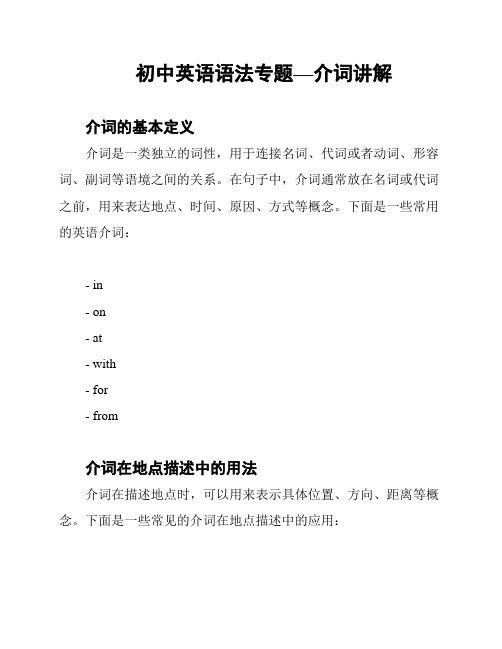
初中英语语法专题—介词讲解介词的基本定义介词是一类独立的词性,用于连接名词、代词或者动词、形容词、副词等语境之间的关系。
在句子中,介词通常放在名词或代词之前,用来表达地点、时间、原因、方式等概念。
下面是一些常用的英语介词:- in- on- at- with- for- from介词在地点描述中的用法介词在描述地点时,可以用来表示具体位置、方向、距离等概念。
下面是一些常见的介词在地点描述中的应用:- in:用于表示在某个范围之内的位置,例如 "in the room"(在房间里),"in the park"(在公园里)。
- on:用于表示在表面、平台或者位置上的状态,例如 "on the table"(在桌子上),"on the bus"(在公交车上)。
- at:用于表示在某个具体位置或者地点,例如 "at the cinema"(在电影院),"at school"(在学校)。
- to:用于表示朝向某个位置的移动,例如 "go to the park"(去公园)。
介词在时间描述中的用法介词在描述时间时,可以用来表示具体时间、时间段等概念。
下面是一些常见的介词在时间描述中的应用:- at:用于表示具体的时间点,例如 "at 7 o'clock"(在7点钟)。
- on:用于表示具体的日期或者星期几,例如 "on Monday"(星期一),"on January 1st"(1月1日)。
- in:用于表示较长的时间段或者某一个时间段内,例如 "inthe morning"(早上),"in July"(在七月)。
介词在原因描述中的用法介词在描述原因时,可以用来表示某事的起因或者原因。
初中英语语法全解——介词(共21张PPT)

6.across, through, past, over, along, down across表示从物体表面横穿;through表示穿过 空间;past表示从某物的一旁经过;over表示从 一边到另一边;along/down表示“沿着”。 John is going to swim across the river tomorrow. She smiled at him as he walked through the door. Walk down the road.
9.as as可以表示“像、按照”,也可以表示“作为”。 You ought to do as the teacher tells you. 10.against against表示“反对”。 There are 10 votes for him and only 2 against him.
Hale Waihona Puke 5.like like表示“像”。 Her hair is dark brown like mine. 6.with with可以表示“和......一起”,也可以表示“带 有”,还可以表示行为方式等。 She came back with a letter in her hand.
7.without without表示“没有,无”。 He found the place without difficulty. 8.for for可以表示目的,也可以表示原因。 I look after the kids for them.
5.before, after ①before后接时间点,表示“在某个时间之前”。 Must I finish my homework before supper? ②after后节时间点,表示“在某个时间之后”。 I go swimming every day after work.
初中介词的用法归纳

初中介词的用法归纳一、关键信息项1、介词的定义及分类2、常见介词的用法及示例3、介词与动词、形容词的搭配4、介词短语在句中的作用5、易混淆介词的辨析6、中考中对介词的考查重点及题型11 介词的定义介词是一种虚词,用来表示名词、代词等与句中其他词的关系,在句中不能单独作句子成分。
111 介词的分类1、时间介词,如 at、in、on 等。
2、地点介词,如 at、in、on、under、behind 等。
3、方式介词,如 by、with、in 等。
4、其他介词,如 for、of、to 等。
12 常见介词的用法及示例121 at 的用法1、表示在具体的时刻,如 at six o'clock。
2、表示在较小的地点,如 at the bus stop。
122 in 的用法1、表示在较长的时间段,如 in the morning。
2、表示在较大的地点,如 in Beijing。
123 on 的用法1、表示在具体的某一天,如 on Monday。
2、表示在物体的表面,如 on the table。
13 介词与动词、形容词的搭配131 与动词的搭配例如,look at(看)、listen to(听)、arrive in/at(到达)等。
132 与形容词的搭配例如,be interested in(对感兴趣)、be good at(擅长)等。
14 介词短语在句中的作用141 作定语如,The girl in red is my sister (in red 作定语修饰 girl)142 作状语如,He studies hard at night (at night 作状语)143 作表语如,He is in the classroom (in the classroom 作表语)15 易混淆介词的辨析151 in 和 onin 表示在里面,on 表示在上面。
152 at 和 inat 表示在较小的地点,in 表示在较大的地点。
初中英语介词的语法解析(一)
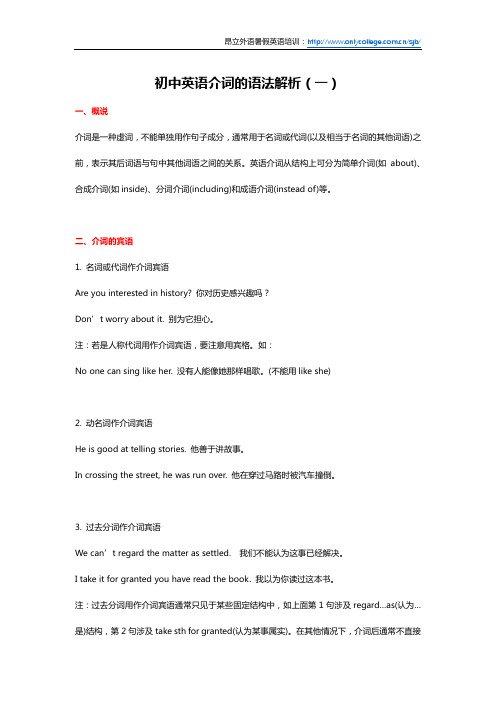
初中英语介词的语法解析(一)一、概说介词是一种虚词,不能单独用作句子成分,通常用于名词或代词(以及相当于名词的其他词语)之前,表示其后词语与句中其他词语之间的关系。
英语介词从结构上可分为简单介词(如about)、合成介词(如inside)、分词介词(including)和成语介词(instead of)等。
二、介词的宾语1. 名词或代词作介词宾语Are you interested in history? 你对历史感兴趣吗?Don’t worry about it. 别为它担心。
注:若是人称代词用作介词宾语,要注意用宾格。
如:No one can sing like her. 没有人能像她那样唱歌。
(不能用like she)2. 动名词作介词宾语He is good at telling stories. 他善于讲故事。
In crossing the street, he was run over. 他在穿过马路时被汽车撞倒。
3. 过去分词作介词宾语We can’t regard the matter as settled. 我们不能认为这事已经解决。
I take it for granted you have read the book. 我以为你读过这本书。
注:过去分词用作介词宾语通常只见于某些固定结构中,如上面第1句涉及regard…as(认为…是)结构,第2句涉及take sth for granted(认为某事属实)。
在其他情况下,介词后通常不直接跟过去分词作宾语,若语义上需要接过去分词(表被动),可换用“being+过去分词”:He went out without being seen by the others. 他出去了,没有被其他人看见。
4. 从句作介词宾语He was not satisfied with what she said. 他对她说的不满意。
I’m worried about where he is. 我担心他上哪儿去了。
(完整版)初中英语语法介词用法讲解与练习
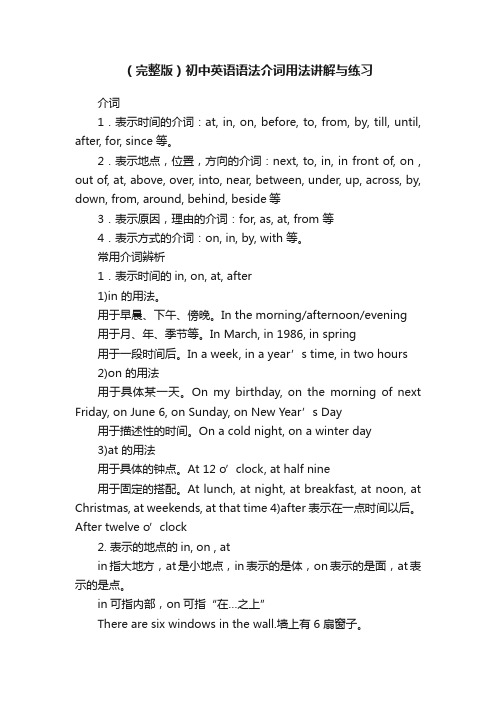
(完整版)初中英语语法介词用法讲解与练习介词1.表示时间的介词:at, in, on, before, to, from, by, till, until, after, for, since 等。
2.表示地点,位置,方向的介词:next, to, in, in front of, on , out of, at, above, over, into, near, between, under, up, across, by, down, from, around, behind, beside等3.表示原因,理由的介词:for, as, at, from 等4.表示方式的介词:on, in, by, with 等。
常用介词辨析1.表示时间的in, on, at, after1)in 的用法。
用于早晨、下午、傍晚。
In the morning/afternoon/evening用于月、年、季节等。
In March, in 1986, in spring用于一段时间后。
In a week, in a year’s time, in two hours2)on 的用法用于具体某一天。
On my birthday, on the morning of next Friday, on June 6, on Sunday, on New Year’s Day用于描述性的时间。
On a cold night, on a winter day3)at 的用法用于具体的钟点。
At 12 o’clock, at half nine用于固定的搭配。
At lunch, at night, at breakfast, at noon, at Christmas, at weekends, at that time 4)after 表示在一点时间以后。
After twelve o’clock2. 表示的地点的in, on , atin指大地方,at是小地点,in表示的是体,on表示的是面,at表示的是点。
- 1、下载文档前请自行甄别文档内容的完整性,平台不提供额外的编辑、内容补充、找答案等附加服务。
- 2、"仅部分预览"的文档,不可在线预览部分如存在完整性等问题,可反馈申请退款(可完整预览的文档不适用该条件!)。
- 3、如文档侵犯您的权益,请联系客服反馈,我们会尽快为您处理(人工客服工作时间:9:00-18:30)。
介词和介词短语介词是虚词,根据意义可分为地点介词、时间介词、方位介词、手段介词和其他介词等。
1表示时间的介词:at, in, on, before, to, from, by, till, until, after, for, since 等。
2表示地点,位置,方向的介词:next, to, in, in front of, on , out of, at, above, over, into, near, between, under, up, across, by, down, from, around, behind, beside等3表示原因,理由的介词:for, as, at, from 等4表示方式的介词:on, in, by, with 等。
常用介词辨析1.表示时间的in, on, at, after1)in 的用法。
用于早晨、下午、傍晚。
In the morning/afternoon/evening用于月、年、季节等。
In March, in 1986, in spring用于一段时间后。
In a week, in a year’s time, in two hours2)on 的用法用于具体某一天。
On my birthday, on the morning of next Friday, on June 6, on Sunday, on New Year’s Day用于描述性的时间。
On a cold night, on a winter day3)at 的用法用于具体的钟点。
At 12 o’clock, at half nine用于固定的搭配。
At lunch, at night, at breakfast, at noon, at Christmas, at weekends, at that time4)after 表示在一点时间以后。
After twelve o’clock2. 表示的地点的in, on , atinat表示的是点。
in3.1)2)指斜下方。
5101520253035五月六月below underThere will be two bridges over the river.河上将有两座桥。
4.表方位的in, on, to.Shanghai is in the east of China.Russia is on the east of China.Japan is to the east of China.5. between, amongBetween指两者之间, among指三者或三者以上。
6. across , over, throughAcross表示从这一边到另一边的横过, over表示从空间通过, through则表示从内部空间穿过。
Can you swim across the lake? 你能游泳过湖吗?The Great Wall winds its way from west to east, across the desserts, over the mountains, through the valleys, till at last it reaches the see.7. with, in ,byWith后跟工具, in后跟语言、材料等, by跟某种方式。
I can write with a pen. 我能用笔写。
He wrote the words in red ink.We often go to school by bike./ I learn English by listening to tapes.8. 看似相同,但意义有别的词组。
At school 在上学In front of 在…前边(外部) In class 在课上At the school 在学校In the front of 在…前部(内部)In the class 在这个班In bed 在睡觉In hospital 住院Go to school 去上学In the bed 在床上In the hospital 在医院里Go to the school 去学校At table吃饭by sea 乘船on earth 究竟At the table 在桌前by the sea 在海边on the earth 在地球上用适当的介词填空1)He knows everything ______________ the school.2)He usually goes out for a walk ________ lunch.3)I have lunch _________ half past eleven.4)Please look ________ the blackboard.5.They work ____________8:00 ___________16:00.5)When do they get up _________ the morning?6)Will we go ____________ bus or _________ foot?7.We have learned a lot _________ you.7)The cup was broken _________ her.8)Where are you ________? I’m _________Beijing.9)We are working _________ the people.10)It is time _________ breakfast.11)Class begins _________ nine.12)We come ______________ different parts of America.13)She lives ________ her father.14)She often gets up _________ half past six ________ the morning.15)We stay here _________ six months.16)You are leaving __________ Shanghai.17)He was born ____________ 1986.18)We usually have meetings ___________ Saturday afternoon.19)Beijing is the capital _________ china.20)Have a cup _____________ coffee please.21)Xiao Li was born ___________ March25,1991.I. 介词的种类1. 简单介词,常用的有at, in, on, about, across, before, beside, for , to, without, to, by, with, of,over, behind, up, after, against 等。
2. 复合介词,如, along with, because of, in front of, instead of等。
3. 介词和其他词类的习惯搭配关系(1) 和动词的搭配,如agree with, ask for, belong to, keep away from, care about等。
(2) 和形容词的搭配,如afraid of, angry with, different from, good at(3) 和名词的搭配,如answer to , key to, reason for, visit to等.***介词后常跟人称代词的宾格和动词的ing形式。
II. 某些介词的意义与用法区别1. at, on, in(表时间) : at表示时间的一点;in表示一个时期;on表示特殊日子A. at后常接几点几分,天明,中午,日出,日落,开始等。
如:at five o’clock(五点),at daybreak (天亮),at noon (中午)),at midnight (半夜),at the beginning of the month (月初), at that time (那时),at that moment (那会儿),at this time of day (在一天的这个时候)。
B. in后常接年,月,日期,上午,下午,晚上,白天,季节,世纪等。
如:in 2006(2006年),in May,2004 (2004年五月),in the morning (早晨/上午),in the afternoon (下午),in the evening (晚上),in the night (夜晚),in the daytime (白天),in the 21st century (21世纪),in three days (weeks/month)三天(周/个月),in a week (一周),in spring (春季)。
C. on后跟某日,星期几,某日的朝夕,节日等,即具体某一天极其早\中、晚.on Sunday (星期日),on a warm morning in April (四月的一个温暖的上午),on a December night (12月的一个夜晚),on that afternoon (那天下午),on the following night (下一个晚上),on Christmas afternoon (圣诞节下午),on October 1,1949 (1949年10月1日),on New Year’s Day.(特别提示):在last, next, this, that, some, every 等词之前一律不用介词2. between, among(表位置) “在…..之间”A. between仅用于二者之间,但说三者或三者以上中的每两个之间的相互关系时,也可用between, 如I’m sitting between Tom and Alice.B. among用于三者或三者以上之间。
如:He is the best among the students.3. beside, besides, exceptbeside意为"在…旁边",He sat beside me.besides意为"除…之外", 包括在内。
What do you want besides this?except意为"除…之外", 不包括在内They go to work in a week except Saturday.4. in the tree, on the treein the tree ,指动物或人等外来的东西在树上,on the tree ,指果实或叶子等树本身长出来的东西5. on the way, by the way, in this wayon the way 指在路上, on one’s way to .....by the way 指顺便问一句in this way 用这样的方法, in that way , in other way, in these ways6. by bus, on the busby bus 是一般说法, 固定搭配, on the bus 特指乘某一辆车7. across, through, 和past“通过, 经过”across从表面经过, 如,road, bridge, riverthrough从内部空间经过, 如: city, woods, forests, window, gatepast , 从旁边经过.EX: Fill in the blanks with across or through.1. We have to walk ____________the gate to go into the factory.2. When we went __________the cinema,we saw a traffic accident.3. Look out ___________the window, please.4. Don’t walk__________the ice. It’s dangerous.5. Suddenly, a young man ran __________me.6. If you walk _________the square, you will see the Sunflower Hotel.7. The river goes ______________the city.8. The old man can swim __________the stream.9. I walked _________him without saying hello.10. The army moved _____________the forests quietly.8. on, above, over, “ 在…上”, up,A. on指在某物表面上,有接触点 a book on the tableB. over指在某物垂直上方,无接触点,也可指覆盖在某物上, 与under相对a cloth over the table , a fan over the tableC. above指在某物的上方即可,不一定是垂直上方反义词为below ,The temperature today is above zero.今天气温零度以上.D. up表示在往上的方向反义词down look up to the sky 抬头看天空11. in, after “……以后”A. “in +段时间”表示将来的一段时间以后, 用在将来时态中., 常回答how soon的提问.B.“after+段时间”表示过去的一段时间以后, 相当于一段时间+ laterMy mother will come back in three or four days.He arrived after five months. = He arrived five minutes later.12. by, with, in , on 表示方式, 手段,工具,A. by 以……方法、手段或泛指某种交通工具, 或跟V-ing形式.B. with 表示用…工具,C. in 表示用…方式,用…语言(语调、颜色)等D. on 表示通过媒介, on the telephone, on the radio, on TVEg: He learned Japanese by listening to the radio.We Chinese have meals with chopsticks.The novel is written in English.Ex: Fill in the blanks with by,with or in,on1. I sent the message to him _________email.2. The pupils write _________pencils.3. Do you know the meaning of word _______Chinese ?4. The man climbed up to the tree _________a ladder.5. They solved the problem _________ communicating.6. The woman was crying ________a low voice.7. The old man often gets news ______the radio..8. We often cut things _________a knife.9. He improved his writing skill ________keeping diaries.10. My grandpa can sing some songs _______Russian.13. 放在地点之前的介词:at, in, onA. at (1)表示在小地方; (2)表示“在……附近,旁边”B. in (1)表示在大地方; (2)表示“在…范围之内”。
